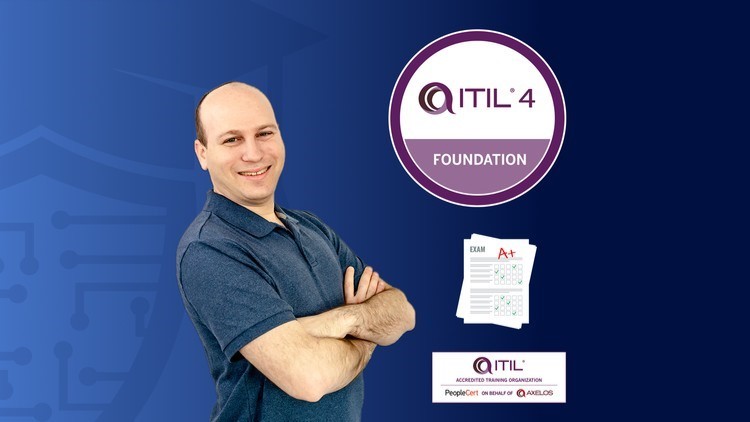
Study smarter and pass your ITIL 4 Foundation, A+, Network+, Security+, PenTest+, CISSP, and other exams easier! In this course, you will learn how to study better, take more efficient notes, and most importantly, how to increase your odds of passing your CompTIA (A+, Network+, Security+, CySA+, PenTest+, CASP+), Microsoft, ISC2 (CISSP, SSCP), EC-Council (CEH), or other IT Certification exams on the first attempt by using our tips, tricks, and efficiency gains to your advantage. After teaching all these techniques in the course, we will dive into some practice exam questions (A+, Network+, Security+, PenTest+, ITIL 4 Foundation, and CISSP) and put these principles to use, showing you how they can help you increase your odds of success, so that you can pass your exam on the first attempt! Teacher: Jason Dion.
Demande de formation
6 Full-length ITIL 4 Foundation Timed Tests. 40 Questions Each and 240 Questions Total (With feedback on each question). With my 6 practice exams containing 40 questions each, I have carefully hand-crafted each question to put you to the test. After passing these exams, you will be fully prepared for what it is like to take the ITIL 4 Foundation Certification Exam. This practice exam course is designed around the official exam guide for ITIL 4 Foundation from Axelos, weighting the 12 Knowledge Areas properly, so you can pass the actual ITIL 4 Foundation Certification Exam with confidence! After each practice exam attempt, you will receive your total final score, along with feedback on each and every question -- telling you exactly why each answer is correct so that you can pinpoint the areas in which you need to improve and perform some additional studying. Created by Jason Dion.
Demande de formation
The release of ITIL® 4 modernizes the popular service management framework, adding coverage of topics such as lean, agile, and DevOps. In this course, get a first look at the ITIL® 4 Foundation exam. ITIL® Expert David Pultorak provides a high-level overview
of ITIL® 4, as well as how updates to the framework affect the ITIL® Foundation certification exam. Learn about the similarities and differences between the ITIL 4® and ITIL® v3 Foundation exams and certification schemes, as well as what sparked the
creation of ITIL® 4 in the first place. Plus, explore the seven guiding principles of ITIL® 4, the four dimensions of service management, the components of the ITIL® 4 service value system, and more.
Ce cours n´est disponible qu´en anglais. Si ce n´est pas un problème pour vous, soumettez votre demande.
This course is in French only. If this is not a problem for you, by all means go ahead and apply.

This installment of the Putting ITIL® into Practice series helps ITIL® Foundation certified professionals get a practical start at applying DevOps concepts within their ITIL®-driven enterprise IT organizations as they move from traditional IT towards cloud and mobile on their journey of digital transformation. Throughout this course, instructor David Pultorak examines where DevOps and ITIL® Foundation concepts intersect in an enterprise setting. He begins by introducing DevOps for ITIL®-driven shops, including a discussion of what cloud-native DevOps and enterprise IT shops do and do not have in common. He then covers ideas on how to adapt DevOps values, principles, methods, practices, and tools to accommodate enterprise IT challenges; how to adapt each of the aspects of ITIL®-driven shops to accommodate DevOps values, principles, methods, practices, and tools.
Topics include:
- What DevOps and enterprise DevOps have in common
- DevOps and enterprise IT challenges
- Enterprise-level change control and release gates
- DevOps values, principles, and methods
- ITIL®-driven shops and DevOps
- Reviewing the service lifecycle
- Strategy, design, operations, and CSI processes
- Technology and architecture
Ce cours n´est disponible qu´en anglais. Si ce n´est pas un problème pour vous, soumettez votre demande.
This course is in French only. If this is not a problem for you, by all means go ahead and apply.

Problem management is about preventing and resolving the problems underlying interruptions of IT services. A set of shared techniques can make the difference between success and failure. ITIL® mentions a set of techniques as best practice, but does not cover how to apply them. This course bridges the gap for IT pros, giving them a concise introduction to the seven problem management techniques endorsed by ITIL, including: Brainstorming Ishikawa diagrams Kepner-Tregoe root cause analysis Fault tree analysis Component failure impact analysis Service outage analysis Post-implementation and major problem review ITIL trainer David Pultorak outlines the what, why, where, and how of each technique, and provide examples so you can practice with the goal of placing each technique into "muscle memory." He examines the 4 Ps that can contribute to or help resolve every problem—people, processes, products, and partners—and provides tips on where to go next.
Topics include:
- Identify what brainstorming is, as well as where and when to utilize it.
- Define what an Ishikawa diagram is.
- Determine the definition of the Kepner Tregue analysis in addition to what it can be used for.
- Examine the components of fault tree analysis.
- Recognize what a component failure impact analysis is and how to use it.
- Explore what service outage analysis is along with where and when to use it.
- Review what post-implementation and major problem review is and how to utilize it.
Ce cours n´est disponible qu´en anglais. Si ce n´est pas un problème pour vous, soumettez votre demande.
This course is in French only. If this is not a problem for you, by all means go ahead and apply.
